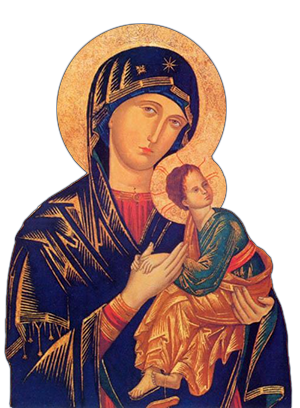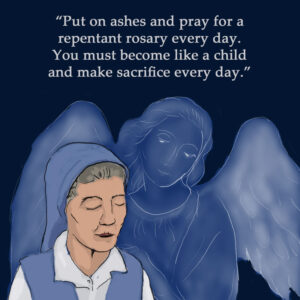Fr. Mitch Pacwa's homily for Wednesday, September 2nd, 2020
After Jesus left the synagogue, he entered the house of Simon.
Simon’s mother-in-law was afflicted with a severe fever,
and they interceded with him about her.
He stood over her, rebuked the fever, and it left her.
She got up immediately and waited on them.At sunset, all who had people sick with various diseases
brought them to him.
He laid his hands on each of them and cured them.
And demons also came out from many, shouting, “You are the Son of God.”
But he rebuked them and did not allow them to speak
because they knew that he was the Christ.At daybreak, Jesus left and went to a deserted place.
LK 4:38-44
The crowds went looking for him, and when they came to him,
they tried to prevent him from leaving them.
But he said to them, “To the other towns also
I must proclaim the good news of the Kingdom of God,
because for this purpose I have been sent.”
And he was preaching in the synagogues of Judea.
This is part of the ministry of our Lord where we see him already going around and preaching but we don’t know yet what the content is. St. Luke will explain that content in Chapter 6, two chapters down; he will explain to us what it is that our Lord taught.
In this section from Chapter 4 all the way to the middle of Chapter 6, he gives one episode after another of preaching to people and he tells us of the reactions to those sermons. He gives the events that surround the act of preaching and teaching and using His authoritative word. And again and again, in this section from Chapter 4 for the first half of Chapter 6, he emphasizes the role of the word that Jesus is preaching, he brings that up; the sermon at Nazareth, the preaching in Capernaum in the synagogue, which was with authority; His authoritative word to cast out the demons. And now, His authoritative word to cast out the fever from Simon’s mother-in-law, and then an authoritative word to heal these people that are coming at the end of the Sabbath–this is on the same day as his sermon in Capernaum, and he had already spoken with authority–already cast the demon out, and now, at the end of the day–that is why it is at sunset, the Sabbath is over–so the people of Capernaum come over in front of the house of Simon and his mother-in-law and the rest of the family–a good size house. You still can see the ruins of the house there.
A number of things that are interesting that they found at that house of Simon were lots of graffiti from the late 1st and early 2nd century; within the lifetime that this was Simon Peter’s house. They also found to fishhooks in the pavement. I am not the only one who is drop those and lost them! Apparently, professionals like Simon Peter and his brother Andrew did too.
Our Lord will continue on with preaching this word, and with the word, we will hear tomorrow, that makes this great catch of fish, that heals a leper, over and over again.
In some ways to understand this whole section of the Gospel and what we are hearing, in terms of the entirety of the message of Luke’s Gospel, we need to go back to The Presentation. Meditating on The Presentation of Our Lord in the temple, 40 days after his birth, is very fruitful here.
The line that in some ways sets the theme for the rest of the Gospel is when Simon the other Simon–the first one in the Gospel–Simon says to the Blessed Mother, “this child is set for the rise and the fall of many. And a sword will pierce your heart,” (that was another part of the story that is appropriate for us in this month of the Seven Sorrows of Our Lady). But the first part that applies to Christ sets the theme of the Gospel. “This child is for the rise and the fall of many in Israel.”
Because what we see, again and again, is that people hear the word that Jesus speaks and the reaction that St. Luke describes in these episodes: the people love what Jesus says in Nazareth until they are saying, “yeah, I would like to see miracles around here.” Not out of an act of faith. “Jesus, we know you can do miracles”–but they do it in the context of keeping him inside the small box they can understand. “Well, he is Joseph’s and Mary’s son, we know the family, we grew up with him, no big deal.” And that prevents them from asking for a miracle in faith. So when he calls them out on that and says it was to the Gentiles that Elijah and Elisha and the widow of Zarafat, living up near Phoenicia, and the Syrian leper, they got healed–“you’re not even like them! You do not have as much faith as the Gentiles.” And then they want to kill him.
In the synagogue, we see that the demon knows Jesus. And here also, we see that the demons know who he is and he has to rebuke them and silence them. But the folks come, and they do have faith, they get healed, unlike the folks in Nazareth. So here in Capernaum the reaction is for their rise. They hear the word that Jesus speaks and they allow him to continue to speak because His Word evokes faith for them, while in Nazareth, it shuts it down.
Throughout the rest of the Gospel, we will see people who are hearing the word that Jesus speaks and reacting with faith, and they rise as a result. They get healed. They get free of the demon. And those who reject it fall; they collapse. This is no different today than it was then. This is one of the reasons that St. Luke has this pattern showing up, he wants us to understand that Simon’s prophetic word, spoken to the Blessed Mother as Simon took the Infant Jesus from her arms and held Jesus in his own arms, and he says that prophetic word; it’s meant to be a word that is not just for some moment of Our Lady’s life, but it is spoken to her so as to become an effective word that continues on down to the present.
And this is where we then have to come in. We have the same challenge when we hear The Word of Jesus Christ. We are obviously here because Our Lord has poured out upon us the gift of faith. We are blessed and we have accepted that gift of faith. We are here to worship Him. We are here especially to receive Him. And we are here to let His Word form us; to allow His Word to take its many different effects, such as we see in today’s Gospel: the word that heals the fever of Peter’s mother-in-law, the word that cast the demons out, that has power over them.
This word has effects such that it will address crowds as Jesus sits in a boat in the upcoming Gospel, and a word that is able to have Peter who failed all night by his own efforts by the word of Jesus he gets the best catch of his life and almost sinks his boat. This word will heal a leper. This word will have all of these different kinds of effects. And this is something that we have also seen throughout our own history: The Word of Christ has had tremendous different effects on the lives of all kinds of sinners.
We will hear later on Simon Peter say “leave me, I am a sinner.” That is the only kind he can speak the word to except for His Blessed Mother. The rest of us are sinners.
He addresses us not when we become perfect people–that is not what he does. He doesn’t say “well, once you straighten out your life, boy, you’re going to hear my word.” No. He wants us to have faith, and then it will be the power of his word spoken to us that will effect the change we need.
Our Lord will work with Peter. Yeah, he is a sinful man, but Our Lord will continue to speak a word to him to correct his impulses, selfishness, his impetuosity, his foolishness; all of those different characteristics, especially that we see in the Gospel of Mark, which was the Gospel that Peter pretty much dictated to St. Mark, his disciple. He’s the one who makes clear, “this is what the Lord had to do with me.”
But it also makes clear to us that this word that Jesus speaks is going to be for our rise away from sin in that gradual lifelong process of becoming free of sin and becoming more like Our Lord. This is one of the effects that we long to see in ourselves. And we can also look at all the great things that have been done because of Christ.
There were the Christians of North Africa, and then again in Constantinople, that invented, for the first time in history, the concept of the hospital. They invented that for the sick, to take care of them.
Christians who hear The Word of God and start rescuing babies that were unwanted and were abandoned in the garbage dumps of Rome.
We invented the concept of the orphanage.
We invented the university.
And so many other ways in which we have responded to The Word of Christ. His Word forms us to become better and better. His Word inspires our artist to make the great cathedrals and paintings–all of these beautiful works of art–this is that Christ’s Word affects that in some of us. This is something that can transform us to do amazing things.
Now, at the same time, we have to remind ourselves that this Word of God–this Word of Jesus Christ–is being pushed out from our Christian Culture. There are a variety of forces the do not want The Word of God to be showing up in any way.
Christmas parades–the nativity scene float is forbidden in some paces.
“Do not mess up Christmas by bringing in the Baby Jesus.”
“No Word of God.”
“You cannot have The Ten Commandments.”
On and on and on.
Now we have to look at our society today and as there are those forces that say no to this, especially in the universities, is that rejection of The Word of God making more beauty to emanate from such people? Is it making more building-up to serve the needs of other people? Is this what we see going on on our streets for those who desecrate the statues?
Another statue was beheaded in Canada this week at a Lebanese church.
By rejecting this word, are they beautifying our cities? Are they even saving black lives? Are they even saving other people’s lives? Are they building hospitals with there activity? Is there lack of The Word of God making them more creative to serve and to drive out the demons that would be violent and destructive? Is the rejection of The Word of God by parts of our society going to make us a better people or is it going to be for a fall? This same pattern applies today.
Do we accept that Word of Christ and let him raise us higher or do we reject it and cause a crash? This will be the same issue they experienced in the Gospel and that we have to live with today.
Transcript of Fr. Mitch Pacwa’s Homily for Wednesday, September 2nd, 2020, provided by WQPH Radio



